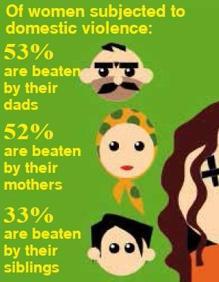Economy, violence top Turkey’s women issues
Zeynep Miraç ISTANBUL
 Economic freedom and violence against women top Turkey’s women’s issues, according to a survey released by daily Hürriyet on the occasion of March 8, International Women’s Day.
Economic freedom and violence against women top Turkey’s women’s issues, according to a survey released by daily Hürriyet on the occasion of March 8, International Women’s Day. While just 23.4 percent of the women surveyed work, only 37.2 percent of women have a personal bank account. Some 62.8 percent of Turkish women therefore do not have a personal bank account and have no economic freedom.
 On the issue of violence against women, 23 percent of Turkish women said they have at least once been a victim of violence at the hands of their husbands.
On the issue of violence against women, 23 percent of Turkish women said they have at least once been a victim of violence at the hands of their husbands.It also appears that violence runs in the family, as the mothers of 55 percent of women subjected to violence at the hands of their husbands say they were also beaten by their fathers. Meanwhile, 71 percent of men who resorted to violence were themselves beaten by their parents when they were a child.
Some 53 percent of women who are victims of domestic violence were also beaten by their fathers, while 52 percent were beaten by their mothers and 33 percent were beaten by their brothers.
The survey, which was carried out for daily Hürriyet by the A&G research firm, was conducted among 2,083 women aged 18 to 55 from 36 provinces and 116 neighborhoods between Feb. 28 and March 1.
Some 30.4 percent of Turkish women believe that without male protection it would be “difficult to survive,” while 47.8 percent believe that no matter how much women work outside of the house they are still responsible for housework.
 On the subject of abortion, 68.4 percent of surveyed women said women should be the sole decider about having an abortion.
On the subject of abortion, 68.4 percent of surveyed women said women should be the sole decider about having an abortion. Some 83.5 percent of surveyed women said they believe women should have the same rights as men in every aspect of life.
Some 61.1 percent of Turkish women said that if more women enter parliament the tone of political debate would improve, while around the same number of women believe that Turkey will become a better society if the number of women politicians increased.
When asked who they like most in the world, 20.1 percent of those surveyed said they liked Hollywood celebrity Angelina Jolie, who is also the U.N.’s Special Envoy of U.N. High Commissioner for Refugees António Guterres. German Chancellor Angela Merkel came in second with 9.3 percent, while Barbadian singer Rihanna placed third with 7.3 percent.
















